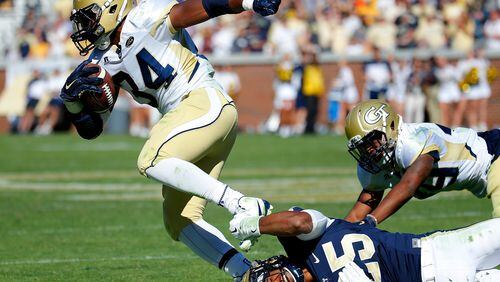[cmg_cinesport url="http://cinesport.ajc.com/embed/ajc-atlanta-sports/sugiura-tech-starting-fall-apart/"]
Georgia Tech has arrived at this point in its five-game slide – in some ways, the performance of the defense didn’t seem all bad, even though by any number of standards it was entirely that.
The Yellow Jackets didn’t force a turnover. Pitt quarterback Nate Peterman has now thrown 84 consecutive passes (57 complete) without an interception. The Panthers put two balls on the ground, but they were both unforced errors on Tyler Boyd punt returns, and he covered both.
Tech didn’t record a single tackle for loss in 66 offensive plays run by Pittsburgh. According to cfbstats.com, that is a first in coach Paul Johnson’s eight-year tenure. Pittsburgh isn’t particularly strong in this area; the Panthers had averaged seven negative-yardage plays offensively in their first five games. And Tech hasn’t been weak, either. But, on a day when the Jackets got a better handle on giving up big plays – just two after allowing 16 in the previous two games – they couldn’t make big plays themselves.
Putting Pittsburgh behind the chains would have been useful on an afternoon in which Pitt was 4-for-8 on third-and-4 and shorter, but 0-for-3 on anything longer.
Despite having two just plays of 20 yards or more to prop up the average, Pittsburgh advanced the ball an average of 5.9 yards per play. For Tech, 5.9 yards is a tick better than its season average against FBS opponents of 6.0 (prior to Pitt).
And what does 5.9 mean? Last year, a defense averaging 5.9 yards per play would have ranked 97th in the country.
Credit: Ken Sugiura
Credit: Ken Sugiura
There were positives to draw – the reduction in big plays, Pitt’s 4-for-11 performance on third downs and another strong game from linebacker P.J. Davis (nine tackles). These occurred in a game, moreover, where defensive coordinator Ted Roof gave considerable playing time to freshman linebackers Brant Mitchell and Victor Alexander as the Jackets played a 4-3 in response to the Panthers’ tight end-heavy sets. Still, it was not winning football.
According to sports-reference.com, from 2010 through last week’s games, there were 17 games in which an ACC team allowed its opponent to gain between 5.7 and 6.1 yards per play and didn’t secure a takeaway. Those teams were 2-15.
"Right now, we're not very good on defense," coach Paul Johnson said. "Facts are facts. We're probably from 10th to 14th in every category in the league. That's what we are. So we've got to find a way to get better."
Effort isn’t so much the problem as execution. Defenders got themselves in trouble by locking on to what was happening in the backfield with the ball rather than keeping their eyes trained on their assignments. Tackles were broken. Blocks were not defeated. The pass rush didn't hurry Peterman, who often threw quick, short routes, sufficiently.
On Pitt’s game-winning drive, the Panthers ran 13 plays – 20 percent of their total for the whole game – to go from their 31 to the Tech 38 before the field-goal try. The Jackets needed one big play to prevent the end result. Linebacker Tyler Marcordes and defensive tackle Patrick Gamble made critical stops in the series. But Tech just couldn’t land the decisive blow, letting Pittsburgh convert a fourth-and-1 and then a fourth-and-2.
“Those are plays we need to make,” Marcordes said. “We’re in the right position. We need to have someone make a play on fourth down and make a stop and get us off the field and get the offense the ball.”
Injury list
Safety Demond Smith did not play, the first game he has missed in his entire career. He had not been on the injury report. Johnson said that he practiced all week and warmed up Saturday but was unable to play. Corey Griffin played in his place and tied his career high with six tackles.
Regarding A-back Broderick Snoddy, whom Johnson said on Wednesday was probably going to play before he was declared out in the Thursday injury report, Johnson said that he “couldn’t go.” Snoddy was on the sidelines with his right hand in a cast.
“Those (injury reports) come out on Thursday,” Johnson said. “You’re going to get all kinds of answers if you ask me before Thursday. They all come to practice every day. That’s what I’m going to tell you.”
Special teams uneven
Long snapper Casey Wilson had three uneventful punt snaps to punter Ryan Rodwell, who had perhaps his best game of the season. Rodwell had three punts averaging 44.3 yards, and the punt team netted 45.3, thanks in some part to Tyler Boyd dropping two of them and then falling on them.
It was Wilson’s first full game after replacing Sean Tobin during last Saturday’s loss to Clemson.
Tech’s return game continued to struggle. Jamal Golden had two kickoffs he was able to return and could only bring them out to the 14 and 24. Last week, the Jackets had six kickoff returns and on averaged reached the 21.2-yard line.
And, of course, kicker Harrison Butker's 50-yard field goal was blocked when the middle of line was stormed by Pittsburgh. Further, defensive tackle Adam Gotsis got through the line on Blewitt's try but was unable to get in Blewitt's line to block the kick.
Busting loose
What B-back Marcus Marshall’s two 58-yard runs had in common (besides the distance):
- Two good reads by quarterback Justin Thomas to give him the ball on an option pitch in the first and a triple-option give on the second.
- Enough help from the offensive line to prevent the plays from getting blown up at the line of scrimmage. On the second, right guard Shamire Devine and right tackle Will Bryan both released to the linebacker level and ensured that middle linebacker Quintin Wirginis wouldn't touch Marshall as he ran past.
- Effective downfield blocking. On the first, A-back Mikell Lands-Davis got enough of safety Jevonte Pitts to give Marshall the space to get upfield and turn on his speed. Wide receiver Ricky Jeune had a decisive block on cornerback Avonte Maddox to keep him out of Marshall's way. On the second, Jeune got in a healthy downfield shove on Pitts to take him out of the play as Marshall ran down the west sideline.
- Deft running by Marshall. Watching Marshall take the pitch from Thomas on Tech's third play from scrimmage and then race down the sideline was something akin to watching the anchor leg of a 4x100-meter relay. On the second 58-yard run, Marshall shifted past Bryan's block on Wirginis like a car swerving around debris in the road, broke a tackle and then bounced to the outside, where Jeune had blocking leverage on Maddox.
Marshall also fumbled, but finished with 159 yards on just 10 carries with two touchdowns. Pretty good work for a first career start.
“You can see he’s got good feet,” Johnson said. “He has a chance to be good.”
[cmg_cinesport url=" http://cinesport.ajc.com/ajc-atlanta-sports/sugiura-tech-starting-fall-apart/"]
Run game returns
Tech cranked out 376 rushing yards on 40 attempts, by far their best run-game effort considering the opponent. After 71 rushing yards against Clemson last week, the "back to the basics" training evidently worked.
"You could recognize our offense again," Johnson said. "It looked like what we're used to doing."
Tech had four runs of 45 yards or longer (two by Marshall and two by Thomas) after having just three runs of 20 or more in the previous four games. Going forward, it's Tech's best hope to defeat Florida State next Saturday and to win games beyond that.
However, Tech was far more productive in the first half. The Jackets gained 264 yards on 23 carries in the first half (11.5 yards per carry) and dropped off to 112 yards on 17 attempts. The second-half rate was a robust 6.6 yards per carry, but more than half of the yards came on one run. The average without it was 3.4 yards per carry.
Long bomb
Pitt kicker Chris Blewitt’s game-winning 56-yard field goal was the fourth longest by a Tech opponent in school history. Notably, the three ahead of him were all taken prior to NCAA rules banning kicking tees (1989) and the narrowing of the goal posts (from 23 feet, 4 inches to 18’6” in 1991).
The longest kick was a 60-yarder by Tennessee’s Fuad Reveiz in 1982.
The longest post-tee field goals by a Tech opponent prior to Blewitt were 53-yarders by LSU’s Colt Davis in the 2008 Chick-fil-A Bowl and Clemson’s Richard Jackson in 2009 (regular season).
If you’re wondering, the longest Tech field goal is 55 yards, by three players – David Bell (1986, vs. Georgia), Ron Rice (1982, vs. the Citadel) and E.O. Whealler (1973, vs. VMI).
The longest field goal since 1989 is 53 yards – Harrison Butker last season against Georgia and Dave Frakes in 1996 vs. Virginia.
In sum
I've probably written this before, but Tech was once again one or two plays away from a different outcome. Johnson keeps coming back to this point, that there's a fine line between winning and losing. While probably not much of a consolation to many, it also happens to be true. Tech, for whatever reason - youth, inexperience, confidence issues, lesser players, insufficient preparation, pressing - just keeps rolling back down the same side of the hill.
But there is something more, and Johnson captured it quite well when he said that "I’m stunned that we’re not better in some areas of the team than we are."
It has been a most puzzling season.








